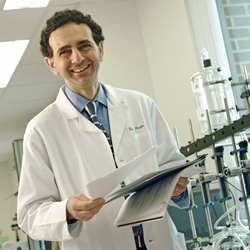9 September 2014. Researchers at Wake Forest Baptist Medical Center in Winston-Salem, North Carolina succeeded in keeping open for 4 hours blood vessels in lab-made pig kidneys, a key step in developing replacement kidneys for patients needing transplants. The work is described in an article published last week in the journal Technology (registration required).
The team, led by Anthony Atala, director of Wake Forest’s Institute for Regenerative Medicine, sought a technique for extending the effective blood flow for replacement kidneys, which up to now, was limited to 1 or 2 hours, on devices sized more for rodents than humans. Earlier attempts ran into problems with blood clots forming in the blood vessels to the kidney, making them more of a danger than a therapy to the patient.
The replacement organs start with kidneys from pigs, which are about the same size as human kidneys, but with the natural organ cells removed, leaving the underlying scaffolding matrix, and a network of blood vessels supporting it. That scaffold is then seeded with the patient’s own cells to grow into a new kidney, which would be less likely to encounter organ rejection than a transplanted kidney from another human donor.
Clots forming in the blood vessels supporting the kidney presented a continuing problem, however, that limited progress. The problems occurred in the endothelial cells, those lining the blood vessels. The researchers traced the problems to methods for seeding the vessels with the patient’s own cells, where the replacement cells became detached and encouraged formation of clots.
Atala and colleagues tested several alternative methods for seeding the kidney’s blood vessels with endothelial cells and found a combination of techniques to address the problem. The team started with using a syringe to introduce the cells to the blood vessels, then increased the flow rate of cells as they accumulated along the lining of the blood vessels. They then coated the blood vessel linings with an antibody corresponding to a peptide known as CD31 that helps keep the endothelial cells in place.
The authors implanted and tested the engineered kidneys in pigs weighing 90 to 110 pounds, and found the combination of new seeding technique and antibody kept the replacement blood vessels open for 4 hours, more time than achieved before. “In our proof-of-concept study, the vessels in a human-sized pig kidney remained open during a 4-hour testing period,” says Atala in a Wake Forest statement. “We are now conducting a longer-term study to determine how long flow can be maintained.”
The researchers believe the cell seeding techniques can be applied as well to other engineered replacement organs, such as liver or pancreas.
Read more:
- System Tests Quality of Engineered Stem Cells, Tissue
- Trial Testing Amniotic, Umbilical Grafts to Heal Wounds
- Heart Disease in Lab Recreated with Stem Cells, Chip Device
- Engineered Cardiac Tissue Helps Veins Return Blood to Heart
- Natural Regenerative Cellular Matrix Frame Grown in Lab
* * *


 RSS - Posts
RSS - Posts
You must be logged in to post a comment.